In the bustling city-state of Singapore, the education sector is not left behind in the rapid march of technological advancement. Teachers, many of whom hold a Master’s in Education, are leveraging technology to create dynamic, engaging, and effective learning environments. In this exploration, we’ll delve into four key methods that are transforming the face of education in Singapore.
1. Interactive Whiteboards
Remember the days of chalk and blackboards? Well, those days are long gone. In the modern Singapore classroom, interactive whiteboards have taken centre stage. These high-tech tools allow teachers to present information in a visually engaging way, making lessons more interactive and stimulating.
For teachers with a Master’s in Education, the interactive whiteboard is more than just a fancy gadget. It’s a tool that can be used to facilitate active learning, encourage student participation, and enhance understanding. For instance, a geography teacher might use an interactive map to illustrate the impact of climate change, allowing students to see the effects in real-time.
Compared to traditional teaching methods, using interactive whiteboards can make lessons more dynamic and engaging. It’s like swapping out your old black-and-white television for a high-definition colour screen – the difference is clear to see.
2. Learning Management Systems
Learning Management Systems (LMS) are another key piece of technology in Singapore classrooms. These digital platforms provide a centralised space for teachers and students to interact, share resources, and track progress.
For teachers, an LMS can be a powerful tool for planning and delivering lessons. They can upload resources, set assignments, and provide feedback all in one place. For students, it offers a convenient way to access learning materials, submit work, and communicate with their teachers.
Imagine trying to organise a group project without a shared platform – it would be like trying to herd cats. An LMS brings order to the chaos, making it easier for everyone to stay on the same page.
3. Virtual Reality
Virtual Reality (VR) might sound like something out of a science fiction film, but it’s becoming a reality in Singapore classrooms. With a VR headset, students can be transported to different worlds, exploring ancient civilisations, diving into the human body, or even walking on the surface of Mars.
For teachers, VR offers a unique way to bring lessons to life. Instead of simply reading about the Great Wall of China, students can virtually walk along it. This immersive experience can help to deepen understanding and make learning more memorable.
Think of it like this: reading about a place in a book is like looking at a black and white sketch, but visiting it in VR is like seeing a full-colour photograph. It’s a more vivid and engaging way to learn.
4. Artificial Intelligence
Artificial Intelligence (AI) is the final piece of the technological puzzle in Singapore classrooms. AI can be used in a variety of ways, from personalised learning programmes to intelligent tutoring systems.
For teachers with a Master’s in Education, AI can be a valuable ally. It can help to identify gaps in a student’s understanding, suggest personalised learning paths, and provide instant feedback. This can free up time for teachers to focus on other aspects of their role, such as fostering a positive learning environment.
Imagine having a personal assistant who could help you with your workload – that’s what AI can offer to teachers. It’s like having a second pair of hands, making the job of teaching a little bit easier.
In conclusion, technology is reshaping the landscape of education in Singapore. From interactive whiteboards to AI, teachers are harnessing the power of technology to create engaging, effective, and personalised learning experiences. And with a Master’s in Education, they are well-equipped to navigate this brave new world of teaching and learning.
Elevate Your Teaching Career with iQTS
As technology revolutionizes education in Singapore, the demand for qualified educators who can navigate this digital landscape is soaring. The International Qualified Teacher Status (iQTS) at UWE is your gateway to meeting the stringent qualification requirements of international schools and propelling your career forward. With the iQTS programme, not only can you boost your interview callbacks by 50%, but you’ll also be part of the 45% who experience increased promotion rates and enjoy a 30% salary uplift. Embrace the opportunity to connect with a global professional community, deepen your understanding of international curricula, and become 65% more adaptable to various education systems. Don’t let work commitments stall your professional development; our flexible online study options are designed to fit your busy schedule. Make Your Next Step towards achieving iQTS and redefine your teaching potential in the digital era.

